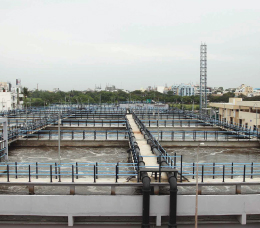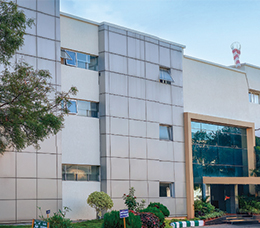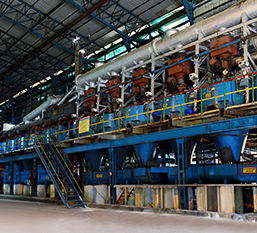Risk Management and Mitigation
The Company is engaged in multiple businesses and there are unique risks associated with each business. The Company follows a well-structured Enterprise Risk Management (ERM) Policy, which requires the organisation to identify the risks associated with each businesses and to categorise them based on their impact and probability of occurrence – at the business level and at the entity level. Mitigation plans are laid out for each risk along with designation of an owner thereof. It is the endeavour of the Company to continually improve its systems, processes and controls to improve the overall risk profile of the Company.
The ERM policy defines the risk parameters within which the businesses should operate. It helps to build a discipline within the organisation wherein all business decisions are taken after assessing the attendant risks and formulating effective mitigation plans to contain the impact of such risks. Since the Company is engaged in diversified businesses having completely different risk profiles, Risk Management Framework for each business has been devised considering its complexity and uniqueness. Sugar business of the Company is agro based and is largely dependent on uncontrollable climatic factors and Government regulations and policies whereas the Engineering business relates to capital goods and infrastructure sectors, which are dependent on the economic growth of the country.
Before dwelling on the normal business risks, it is imperative to evaluate the recent emergent risks as a result of COVID-19. The pandemic has brought about most unprecedented public health and socio-economic crisis in our lifetime across the globe. To check the spread of virus, the Government declared complete lockdown from March 25, 2020 till May 3, 2020 during which period only essential services were permitted to operate. Subsequently, the lockdown is being relaxed in phases. Many sectors of the economy have been badly hit due to disruption in activities and they may take time to attain normal operations due to acute constraints relating to financial resources, supply chain, demand and labour availability.
It seems that the major business of the Company – Sugar along with Cogeneration and Distillery is not likely to be impacted. These businesses, being essential goods in nature, operated uninterruptedly during the lockdown period with the active support of the State and Central Government in overcoming supply chain challenges. The demand of sugar and ethanol declined temporarily during the lockdown period but since then these have been normalised.
The business operations of engineering business were impacted during the lockdown period due to the closure of the factory/project sites but these resumed normal operations by the middle of May 2020. The normalcy in the business environment depends on how the pandemic is controlled and how the business cycle from supply chain partners to the customers is normalised. There is presently a great deal of uncertainty but the initial feedback from customers is encouraging. It is premature to assess any long-term impact.
The businesses are observing all precautions at the work places to keep the employees safe and to avoid spread of the virus. All prescribed protocols and guidelines are being followed. Wherever feasible, model of work from home is being followed and in view of travel restrictions, the digital modes are being followed to maintain active contacts with the supply chain partners and customers.
Sugar business is exposed to significant external risks, which mostly are uncontrollable and thus, it is imperative to optimise the controllable business productivity and efficiencies on a dynamic basis to counteract the impact of such external risks. Other internal risks are moderate and are by and large predictable and manageable.
It is the objective of the Company to be amongst the top performers in UP, much above the average, so that it remains less impacted by the cyclicality associated with this industry. During Season 2019-20, the Company has achieved comparable recovery of 11.97% - 18 basis points over the previous season and 24 basis points higher than the average recovery achieved in Uttar Pradesh.
Some of the key external risks to which the Sugar business is exposed are described hereinbelow:
The Gears and Water businesses are in the capital goods and infrastructure sectors and are largely dependent on the industrial and general economic conditions in the country which stimulate demand of the products of our Engineering businesses. These businesses are exposed to the following major risks:
Risk
Risk of economic slowdown
Slowdown in the economy results in sluggish demand of the products of the user industries, which in turn has adverse effect on investment spend on capital goods required for capacity creation or modernisation.
Scarcity of funds
The sluggish demand puts financial stress on the industrial companies and in view of stressed financials and risk aversion, the lenders generally subject the projects to stringent diligence before arriving at funding decisions. The user industries are forced to defer their expansion plans in view of delay in funding, resulting in poor off-take of capital goods.
Technology risks
It is extremely vital for the Engineering business to offer technology and benchmark efficiencies at par with the competition and in the event of a significant gap in its offerings as compared to its peers, the customers may not prefer the products of the Company.
Project delays and payment risks
On account of financial problems with customers, including non-achievement of financial closure, the project may get delayed, resulting in credit risks, cost overruns and blockage of working capital.
Mitigations
Gears business
Even during slowdown, the Gear Business has fared well in FY 20 with respect to turnover, profitability and order booking. The operations were somewhat impacted in March 2020 due to COVID-19. The business model of Gear Business is robust with main verticals being supply of Gear boxes to OEMs and Retrofitting and refurbishment business, with a focus to expand export footprints. The Company is working on new areas, such as manufacturing of Gear internals to other OEMs under ‘Built-to-Print’ and foray into Defence sector using a range of products which are aligned to ‘Make in India’ initiative. The diversified business model will enable Gear Business to avoid overdependence on few sectors and withstand sector specific cyclicality.
Water business
The order book of Water business is healthy and despite its operation getting affected in March 2020 due to COVID-19, it has reported impressive growth in turnover and profitability. The order intake had been subdued though, in view of prolonged election activities, other disruptions and finally the impact of COVID-19 towards the end of the year. These slowed down the order finalisation, which is likely to pick up momentum in third quarter of FY 2021.
In respect of water business, the Company has access to almost all technologies currently being used, including through its Israeli associate.
The Company does proper diligence on its customers prior to accepting any order, which includes evaluating its financials, ensuring financial closure of the project, credit ratings (if any), track record and market feedback, and continues to closely monitor any financial stress which the customer may be subject to during the execution of the project.
2020 Triveni Engineering, All Rights Reserved
Design & Developed by RDX Digital Pvt. Ltd.







